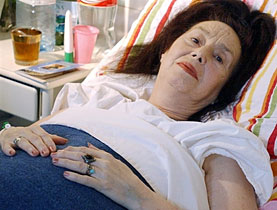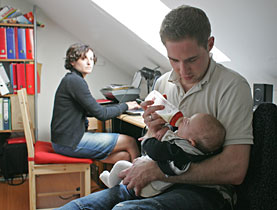Switzerland records first over-60 mothers

Switzerland is no exception to the late motherhood trend but the 2007 birth statistics have thrown up a new record – two first-time mothers aged over 60.
The two 61-year-old mothers, one of whom had twins, will no doubt be receiving special attention this Mother’s Day. But their actions have reopened the debate on how far fertility treatment should defy natural limits.
The women, who remain anonymous, became pregnant after being implanted abroad with embryos conceived from donor eggs, a procedure which is banned in Switzerland.
Clinics in several countries, including Greece, Spain and the Czech Republic have a steady stream of clients from European countries where regulations are stricter. Some of the clinics have no age limit for patients and prices range from SFr4,000 to SFr6,000 ($3,844-$5,766) per attempted implantation.
Women above the average menopause age who go on to have established pregnancies are normally cared for back in their home countries, presenting problem cases for doctors who have to manage very high risk pregnancies.
“There are some changes in the uterus that occur with age and the vasculature that is needed to provide growth to the embryo and foetus is impaired,” Michael Hohl, head doctor of the women’s clinic in Baden Hospital told swissinfo. This leads to a high rate of miscarriage.
“These women also have a much higher incidence of typical pregnancy complications like hypertension, diabetes and preeclampsia,” he added.
Isolated cases
However, these old mothers are still a tiny minority. Just five women aged 50 and over gave birth in Switzerland last year.
“Our experience shows it is very rare for an older woman to ask for fertility treatment. In over 20 years we have never had a patient over 50 come to us,” Hohl said.
The average age of women seeking IVF treatment in Switzerland is 36. Hohl, along with other Swiss doctors working in the field of assisted reproduction, finds it unfair that women in Switzerland are denied the option of using donor eggs to conceive.
“We don’t understand why oocyte egg donation is not allowed while sperm donation is. It’s not correct to treat women differently,” Hohl said.
“It is very important to understand that the main group of patients who would benefit from oocyte donations is not these unusually old women but younger women who, for whatever reason, do not have eggs that can be fertilised,” he added.
Irene Hoesli, division head of the obstetrics unit at Basel University Hospital, also supports calls for egg donation to be permitted in Switzerland.
“We have young women who have unfortunately had very early menopause or whose fertility has been affected by chemotherapy,” Hoesli told swissinfo.
Donor eggs
In such cases, the only way the women can become pregnant is with the use of donor eggs, usually fertilised with their partner’s sperm in vitro before being implanted into the womb.
However some experts warn of future identity problems for children born of anonymously donated sperm or eggs when they eventually learn that their biological parents are untraceable. Added to that might be the social stigma of having an unusually old mother.
In medical terms, a pregnant women aged 35 or over is deemed to be an older mother. This is the age beyond which various tests are offered to rule out chromosomal abnormalities.
But with women in Switzerland on average having their first child at 30, so-called older mothers have almost become the norm.
“Depending on her lifestyle, a woman of 40 can be very fit and healthy. Once the first trimester is over and the risk of miscarriage diminishes, the pregnancy can be very uneventful,” Hoesli said.
Growing prosperity and advances in equality, coupled with the advent of birth control, have made motherhood a complicated step for many women, who face real or perceived obstacles to fulfilling their wish for a child.
“There have been changes in society causing a lot of women to delay their childbearing to a later age. This is a true issue of our time and we have to face it,” Hohl said.
Number of children per woman in Switzerland (2006): 1.44 (1964: 2.7)
Currently foreign women have more children: 1.9 per woman vs. 1.3 children per Swiss woman
Mean age of childbirth (in years): 30.4 years
The average age for women seeking IVF treatment at one of Switzerland’s 24 fertility clinics is 36.
The birth rate went up slightly during 2007 by 1.1% to 74,500.
IVF (In vitro fertilisation) is a technique in which the woman’s ovaries are stimulated to produce extra egg cells. These are then removed from the body to be fertilised by sperm in a laboratory. The embryos are transferred to the woman’s womb in the hope that one will successfully implant and result in a viable pregnancy. This procedure is available in Switzlerland.
Oocyte donation, just like sperm donation, is a procedure by which women can make their egg cells available to others. The donated oocyte can then be fertilised with the father’s sperm and implanted. The child will receive half its genetic make-up from the donor woman, although the woman who gives birth to the child is legally recognised as its mother. This procedure is not allowed in Switzerland.

In compliance with the JTI standards
More: SWI swissinfo.ch certified by the Journalism Trust Initiative










You can find an overview of ongoing debates with our journalists here . Please join us!
If you want to start a conversation about a topic raised in this article or want to report factual errors, email us at english@swissinfo.ch.